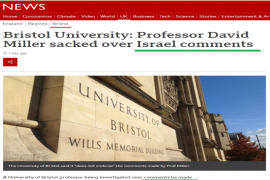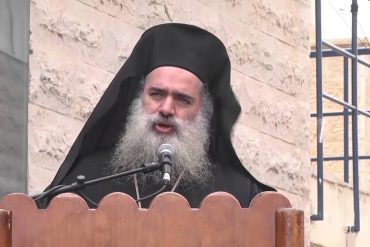The September 6th edition of the BBC World Service radio programme ‘Newshour’ included an item (from 45:05 here) about six security prisoners who had escaped from the Gilboa prison early that morning. Presenter Razia Iqbal chose to describe the fugitives as “men” rather than prisoners in her introduction.
Iqbal: “To Israel now and drones and helicopters are being used to hunt six men who escaped from a high security prison in northern Israel early on Monday morning. It’s been described as the worst prison break in the country’s history. Let’s go to Jerusalem and speak to our correspondent Tom Bateman. A high security prison, Tom – how did they get out?”
Tom Bateman told listeners how the breakout had been discovered, describing the escapees as “six Palestinian prisoners”. Iqbal then asked for further details.
Iqbal: “Six Palestinians, you say. What…what was it…what more do we know about them?”
Listeners heard a confused response to that question from Bateman, with the terror offences of which most of the escaped prisoners were convicted described merely as something that “Israelis say” is the case. [emphasis in italics in the original, emphasis in bold added]
Bateman: “Well they’re all…or five of the six are…have been…ehrm…were serving life sentences…ehm…err…the Israelis…ehm…err…say that each case linked to deadly attacks against Israelis.”
Continuing to avoid the word terrorism, Bateman continued:
Bateman: “But the most high-profile; Zakaria Zubeidi – a former leader of one of the Palestinian militant groups, the Al Aqsa Martyrs Brigades. Now he’s very well-known to Israelis and Palestinians alike…ahm…first…during the first Intifada was…ahm…known for masterminding attacks and had been on Israel’s radar for many years. He was actually granted an amnesty…ahm…in 2007 but later went on the run and later jailed again. So he’s been in and out of prison.”
Zubeidi was born in 1976 and was therefore around 11 years old when the first Intifada began. His planning and carrying out of terror attacks on behalf of Fatah’s Al Aqsa Martyrs Brigades actually took place during the second Intifada. Bateman failed to clarify that the amnesty given to Zubeidi and others was revoked due to his return to terrorism and that his ongoing trial relates to multiple offences, including two shooting attacks on buses in 2018 and 2019 which the BBC failed to report.
Listeners heard only in passing that the other five escaped prisoners are also members of what Bateman refrained from clarifying is a terrorist organisation.
Bateman: “But this is an extremely embarrassing escape as far as the Israeli authorities are concerned, particularly with someone as high-profile as that and I think that’s why there is now this very urgent investigation by the Israelis into how it could have happened. As for the Palestinian militant groups Hamas and Palestinian Islamic Jihad, that five of the men belong to, have described their actions and the escape as heroic.”
That confused and in part inaccurate account – which avoided the use of the word terror and failed to adequately clarify why those particular security prisoners were imprisoned – was apparently the best that the BBC could provide to its worldwide radio audiences.
Related Articles:






BBC’s refusal to use the correct description of “terrorist” is applied also to their UK broadcasts. Instead they always use “militant” – even when describing a Jihadi who blows up children in a suicide attack. That is why I will refuse to pay their £175 annual tax – otherwise known as Licence Fee.
Palestinian ‘prisoners’ IRA, IS, al Quada *terrorists.